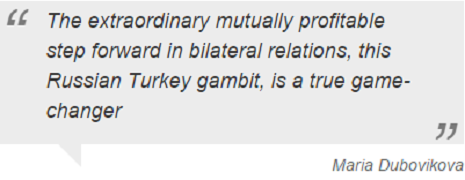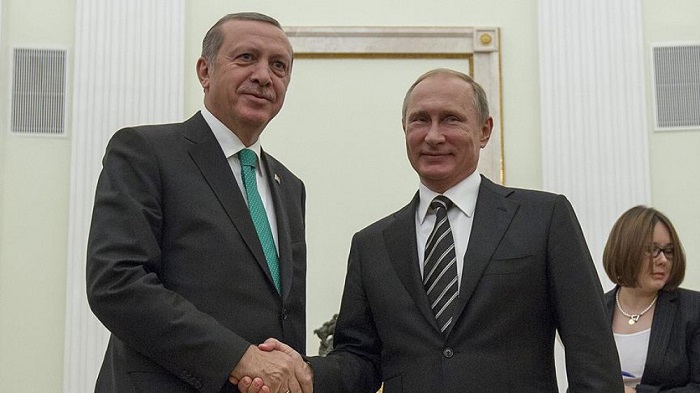The status of the visit of Russia’s President Vladimir Putin to Turkey was upgraded from the scheduled ordinary “working visit” to the highest level of the “state visit” at the last minute. The differences between these two types of visits are largely ceremonial, but in the current circumstances the upgrade had an important symbolic meaning and message. The message was both for Turkey itself, showing Russia’s strongest intentions, special respect and interests and for the West, showing that Russia still has trump cards in its pockets, the ability to act in conformity with its interests despite external pressure. Russia wanted to draw attention to the visit to make the decisions taken and agreements arranged and signed noticeable on the world stage. Moreover, as it was fairly mentioned by Al Arabiya News columnist Ceylan Ozbudak, it was the first presidential visit in the history of Russia-Turkey relations and this marks a new high in bilateral ties.
Trading ties
It would not be out of place to remind observers that Turkey is the second largest buyer of Russian gas and its second largest trading partner. Now the countries want to increase bilateral commerce from $24 billion this year to $100 billion a year by 2020.

After South Stream, an abandoned pipeline project, became a leverage of influence, the West tried to use it to pressure Russia and show it its place. It was then quite evident that Russia would not be slow to respond, as the Bear hates being talked to from position of force. The remaining question was how Russia would answer. Aspirations were very naïve, as the West expected Russia to become more appeasable on other issues of the international agenda and to change its foreign policy course.
The announcement of the drop of the South Stream pipeline was a bolt from the blue. Its replacement by another pipeline makes Russia less dependent on the European politicization of the energy sphere and strengthens its position as a natural gas exporter which had been previously weakened. The new pipeline to be built instead of the South Stream would have the same overall capacity as the dropped project. This is a win-win game for Russia and Turkey. Thus the new infrastructure would make Turkey a gas hub and transit country. Turkey gets a lever of influence over the European Union, its becomes much stronger in terms of geopolitics and economic influence. Russia, having sacrificed the South Stream pipeline, loses nothing. Russia is liberating itself from Ukrainian hysterical politics and will prevent itself from any further attempts of blackmail. At the same time, Europe will become dependent on gas transit through Turkey, instead of the state of Ukraine, and loses strong levers of influence over Russia.
Mutually profitable steps
The extraordinary mutually profitable step forward in bilateral relations, this Russian Turkey gambit, is a true game-changer. The countries have much discord over political issues, such as the Syrian conflict, the Ukrainian problem and others, especially taking into account the Turkish membership in a hawkish NATO. They have different approaches toward many issues of the international agenda, however it does not prevent the players from talking freely about their views in order to find a compromise. The countries understand and acknowledge the necessity to listen to the expressed positions and concerns of each other, especially as Turkey seeks a greater role in international politics.
The key loser in the current situation is Europe, which has misidentified the importance of the South Stream pipeline for Russia, Russia’s readiness to act as well as Russia’s relations with its Eastern partner. The visit of Russia’s president to Turkey and its results transform the international system, revealing that despite the will of some international actors, it has a strong tendency towards a multipolar logic of international relations on the basis of cooperation and harmonious coexistence even if disputes still exist. The sooner the West realizes this, the better it will be for the whole international community and for the West itself. Another conclusion we should draw from this story is that the politicization of the economy and energy sphere do not correspond with common sense, it is instead completely counterproductive and rather risky.
More about:
















































